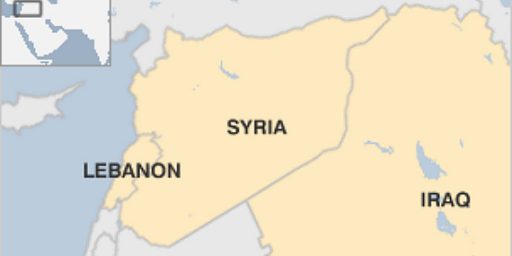Israel and Hezbollah Both Declare Victory
An AP report on Israel begining its troop pullout from Lebanon includes this passage several paragraphs in:
On Monday, both Israel and its main backer, the United States, portrayed Hezbollah as the loser — and by extension, its main backers, Iran and Syria. “There’s going to be a new power in the south of Lebanon,” Bush said.
But Hezbollah’s leader, Sheik Hassan Nasrallah, claimed a “strategic, historic victory.” Much of the Arab and Muslim worlds would agree. Hezbollah’s ability to withstand the vastly superior Israeli military — and hit back with deadly ambushes and cross-border rocket volleys — has given it heroic stature. In Damascus, Syrian President Bashar Assad said the region has changed “because of the achievements” of Hezbollah, and U.S.-supported political changes were “an illusion.”
The sentiments could complicate any attempts to disarm or sideline the guerrillas — who also have 14 votes in Lebanon’s legislature and two in the Cabinet. Nasrallah drove home the point by deriding Lebanese officials who have urged Hezbollah to give up its weapons. “This is immoral, incorrect and inappropriate,” he said.
While Israel won militarily–inflicting far more damage than it absorbed–it rather clearly lost politically. The evidence continues to mount that Hezbollah has emerged emboldened and with increased respect in the Arab world. The moderate Arab states that rushed to condemn Hezbollah for provoking the war, presumably expecting Israel to finish them off, have not been heard from in weeks.





Hezbollah hit Israel’s fists with their face until they won.
So the perception is that Hizbollah won. Great. That guarantees the next battle wil be an order of magnitude greater. The only question now is when.
Unlike the previous two commenters I think that, for this particular conflict, a negotiated settlement of some kind was by far the best outcome that could have been expected. I’m concerned that UNSC1701 was as toothless as it was; as I noted in my post yesterday I think it gave Hezbollah more legitimacy than was required and that’s having an impact already.
Dave, 1701 basically said Israel and the international community “recognized” as a legitimate party, an equal so to speak, to the ceasefire. The government of Lebanon was basically pushed to the side in the agreement to provide a figleaf of legitimacy. Hezbollah definitely came out stronger.
meant to say they recognized Hezbollah as an equal.
Not directly on point, but (1) tied to Bush’s absurd “Israel won!” statement and (2) too good to miss:
George Will finds the administration “eager to repel all but the delusional“:
(How bad did it hurt Will to write those words?)
“Realism”–it’s the new idealism!
JJ’s take on the Israel-Hezbollah debacle is simply realist: Israel set out to accomplish X, failed to do so, and probably hurt both its own and the U.S.’s goals. An administration that can’t see that, and that has to shred its own credibility rather than concede that any political opponent ever had a good point, is out of touch with reality.
Anderson: I submitted a piece for publication a couple hours ago making that point in a more detailed way.
Anderson: I submitted a piece for publication a couple hours ago making that point in a more detailed way.
Great minds, etc.
The administration could defend itself by saying that “Israel won!” is propaganda necessary to avoid encouraging our enemies. I just don’t think that a democracy can afford to put that high an emphasis on propaganda; my hypothesis is that we ultimately make a stronger impression on our enemies by our realistically dealing with challenges and problems.
Recall Asquith’s wry joke about the Imperial General Staff in WW1: they kept 3 sets of casualty figures, one to deceive the public, one to deceive Parliament, and one to deceive themselves. Sounds familiar.
On a related note: Israeli F-15s downed over Lebanon
Not to mention the ceasefire only treats the symptoms and not the underlying illness. This is a zero-sum game–until one side achieves a hard goal truces and resolutions are nothing more than bandaids over a sucking chest wound.